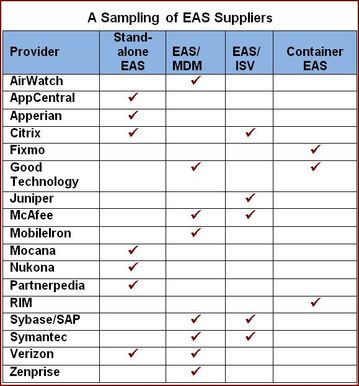- A TechNote on Wireless and Mobility
- Joanie M. Wexler
- Technology Analyst/Editor
- Editorial Director, TechNotes
The task is partly about application distribution but mostly about information management, security and control. While you might long to mimic the popular user experience of the public Apple App Store or Android Market, mobility in today's bring-your-own-device (BYOD) era calls for more sophisticated back-end controls.
You require security mechanisms that automatically work across multiple mobile OSs, many of which aren't in IT's skill set. You also might want to selectively grant or deny access to apps based on parameters such as device type, mobile OS version, user geography and wireless network connection type.
 Public app stores as business-user distribution channels don't have these qualities. And they tend to put control in users' - not IT's - hands. As a result, many providers have emerged to fill the enterprise mobile-app control gap (see table).
Public app stores as business-user distribution channels don't have these qualities. And they tend to put control in users' - not IT's - hands. As a result, many providers have emerged to fill the enterprise mobile-app control gap (see table). "Consumer app stores are fundamentally inappropriate for privately developed enterprise apps," says Lisa Phifer, president of networking consultancy Core Competence and a contributor to Webtorials TechNotes on Wireless and Mobility. "Businesses don't want to publish their private enterprise apps to the world. Nor do they want to undergo Apple or Google review processes," required for apps to publish at their stores.
As a result, industry focus on enterprise-grade mobile application management and security has ramped up. The arrival of Apple iOS 4 about a year ago got EAS efforts cooking, observes Bob Egan, vice president of strategy at Mobiquity, a Boston-based mobile computing professional services firm.
iOS 4 was the first version of Apple's mobile OS containing APIs for securely connecting enterprise storefronts to Apple devices, he explains.
The Many Faces of Mobile App Management
EASs should offer you a way to get your business apps to the appropriate users based on their role and associated access rights within the company. This can be achieved at a site that the EAS provider builds for you and possibly also hosts for you. Various profiles of EAS companies have emerged, and they are described below.
• Standalone EAS/Storefront Only. Some EAS companies develop - or supply the tools for you to develop - an interface to a catalog of apps. They leave the back-end integration with your network security architecture up to you or count on you hooking your storefront into the management and security infrastructure of a mobile device management (MDM) company or other security company.
• MDM Vendors with EAS. Most companies known for their multi-OS MDM solutions now also offer EAS. MDM is an umbrella category for an array of policy-based mobility management and security tools that can be deployed in a premises-based configuration or as a hosted service with a common management interface. Only those with agent-based solutions (client software for the various mobile software platforms) can use the OS APIs that enable enterprise app installation, says Phifer.
• ISVs with EAS. Some enterprise software companies are elbowing their way into the EAS (and MDM) business. This is a way to get more of their core software products - databases, enterprise resource planning (ERP), customer relationship management (CRM) - securely onto the scores of corporate- and employee-liable devices being deployed in businesses.
• App "Container" Providers. Some MDM companies encrypt data at the application level to secure corporate-confidential data used by mobile apps. One complaint here has been the tendency to wrap the application experience in the look-and-feel of the MDM supplier, rather than delivering a native application experience to end users.
Answer to the Question
The headline of this article asked whether you need an enterprise app store. "If enterprises need to be in control, they need an enterprise app store," asserts Phifer.
"They need the ability to privately publish and deploy their own apps. That's true even for an enterprise that cares about a single OS and wants to make an app available to the entire workforce."













Great article, but you let off one company, App47. We have not only an EAS for distribution of both custom enterprise apps, but public Apps though iTunes and the Android Marketplace. However, we don't stop there, we help the enterprise manage the full lifecycle of mobile App through configuration, performance, crash log reporting and many more features. Check us out at http://app47.com.